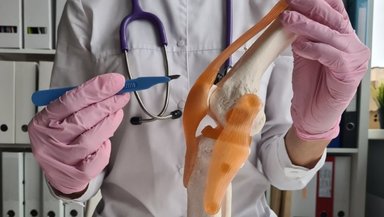Key Questions to Ask Your Surgeon Before Total Knee Replacement

Medicine Made Simple Summary
Preparing for total knee replacement (TKR) can feel overwhelming. Many patients don’t know what to ask their surgeon, and important details can get overlooked. The right questions help patients understand the surgery, set realistic expectations, and feel more confident about their decision. This blog highlights the most important questions to ask before TKR, explains why they matter, and provides simple, patient-friendly answers to guide your conversations with your doctor.
Introduction
Total knee replacement is one of the most effective surgeries for relieving pain and restoring mobility in patients with advanced arthritis. Yet, for many people, the thought of surgery raises anxiety. What will recovery be like? How long will the implant last? Are there risks I should know about? Doctors often cover the basics, but it is easy to forget key details during appointments. That’s why preparing a list of questions is so important.
Why Asking Questions Matters
Patients who ask questions are more satisfied with their surgery and recovery. Good communication with your surgeon ensures that:
- You understand the procedure and its goals.
- You know the risks, benefits, and alternatives.
- Your personal lifestyle and health are considered.
- You set realistic expectations for pain relief and activity.
By asking questions, you turn the decision into a partnership rather than simply following instructions.
Questions About the Surgery Itself
1. Do I Really Need a Knee Replacement Now?
Not all knee pain requires immediate surgery. Ask if non-surgical treatments like injections, physiotherapy, or medications could still help. This ensures surgery is chosen only when it is truly necessary.
2. What Type of Knee Replacement Will I Have?
There are different procedures, such as total knee replacement and partial knee replacement. Knowing which is best for your condition helps you understand the scope of surgery.
3. How Many Knee Replacements Have You Performed?
Experience matters. Surgeons who perform more replacements each year tend to have better results and lower complication rates.
Questions About Implants
4. What Type of Implant Will You Use?
Implants differ in design, materials, and fixation method. Some are cemented, while others are cementless. Ask why your surgeon prefers one type over another for your case.
5. How Long Will the Implant Last?
Most implants last 15–20 years, but lifestyle factors such as age, activity level, and weight play a big role. Younger patients may eventually need a revision.
Questions About Risks and Safety
6. What Are the Main Risks of This Surgery?
Risks include infection, blood clots, stiffness, and implant loosening. Knowing which risks apply to your health helps you prepare.
7. How Do You Prevent Complications?
Hospitals use many safety measures, such as antibiotics to prevent infection and blood thinners to reduce clot risk. Ask about your hospital’s protocols.
Questions About Recovery
8. What Will Pain Be Like After Surgery?
Understanding pain levels helps reduce fear. Surgeons can explain options such as medications, nerve blocks, and ice therapy.
9. How Long Will I Be in the Hospital?
Some patients go home the same day, while others stay 2–3 days. This depends on your overall health and support at home.
10. What Kind of Rehabilitation Will I Need?
Physiotherapy is essential. Ask how often you’ll need therapy, whether it will be at home or in a clinic, and what exercises are most important.
11. When Can I Return to Daily Activities?
Ask about realistic timelines for walking without support, driving, working, and traveling.
Questions About Long-Term Outcomes
12. What Results Can I Expect?
Pain relief and mobility improvement are common, but each patient’s outcome varies. Ask for realistic goals based on your condition.
13. Will I Be Able to Play Sports or Exercise?
Most surgeons recommend low-impact activities like swimming and cycling but discourage running or jumping.
14. What Happens If the Implant Wears Out?
Younger patients may need revision surgery later in life. Ask how revisions are handled and what outcomes you can expect.
Questions About Preparation
15. How Should I Prepare Before Surgery?
Preparation affects results. Losing weight, strengthening muscles, and managing health conditions like diabetes can improve recovery.
16. What Support Will I Need at Home?
Ask about help with cooking, bathing, and mobility. Planning ahead reduces stress during the first weeks of recovery.
Questions About Costs and Insurance
17. What Will My Surgery Cost?
Even with insurance, costs vary depending on hospital, implant type, and length of stay. Ask for a clear breakdown.
18. Is My Insurance Coverage Adequate?
Confirm whether your insurance covers not just surgery but also rehabilitation, follow-up visits, and possible complications.
How to Use This List
Bring this list of questions to your appointment and write down the answers. If anything is unclear, ask for more explanation. No question is too small—understanding every aspect of your surgery helps you feel in control and improves outcomes. By being proactive, you take an active role in your care rather than leaving everything to chance.
Conclusion
Total knee replacement is a major decision, but asking the right questions makes it less intimidating. From implant choices to recovery timelines, open conversations with your surgeon ensure that treatment is tailored to your needs. Use this guide as a checklist, take notes during appointments, and don’t hesitate to revisit questions as you learn more. With the right preparation, patients can face surgery with confidence and look forward to a more active, pain-free future.
References and Sources
American Academy of Orthopaedic Surgeons. Total Knee Replacement Guide







































